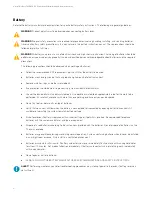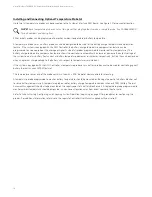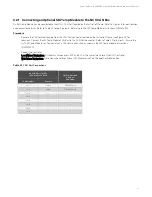
Vertiv™ NetSure™ A50B50 DC Power Retrofit Installation and User Instructions
``
v
Important Safety Instructions
Safety Admonishments Definitions
Definitions of the safety admonishments used in this document are listed under “Admonishments Used in this Document” on page iv.
General Safety
DANGER!
YOU MUST FOLLOW APPROVED SAFETY PROCEDURES.
Performing the following procedures may expose you to hazards. These procedures should be performed by qualified
technicians familiar with the hazards associated with this type of equipment. These hazards may include shock, energy,
and/or burns. To avoid these hazards:
a)
The tasks should be performed in the order indicated.
b)
Remove watches, rings, and other metal objects.
c)
Prior to contacting any uninsulated surface or termination, use a voltmeter to verify that no voltage or the expected
voltage is present. Check for voltage with both AC and DC voltmeters prior to making contact.
d)
Wear eye protection.
e)
Use certified and well maintained insulated tools. Use double insulated tools appropriately rated for the work to be
performed.
Voltages
AC Input Voltages
DANGER!
This system operates from AC input voltage capable of producing fatal electrical shock. AC input power must be
completely disconnected from the branch circuits wiring used to provide power to the system before any AC electrical
connections are made. Follow local lockout/tagout procedures to ensure upstream branch circuit breakers remain de-
energized during installation. DO NOT apply AC input power to the system until all electrical connections have been
completed and checked.
DC Output and Battery Voltages
DANGER!
This system produces DC power and may have a battery source connected to it. Although the DC voltage is not
hazardously high, the rectifiers and/or battery can deliver large amounts of current. Exercise extreme caution not to
inadvertently contact or have any tool inadvertently contact an output terminal or battery terminal or exposed wire
connected to an output terminal or battery terminal. NEVER allow a metal object, such as a tool, to contact more than one
termination or battery terminal at a time, or to simultaneously contact a termination or battery terminal and a grounded
object. Even a momentary short circuit can cause sparking, explosion, and injury.
DANGER!
Follow local lockout/tagout procedures to ensure DC branch circuit protection devices remain de-energized
during installation at loads, as required.






































